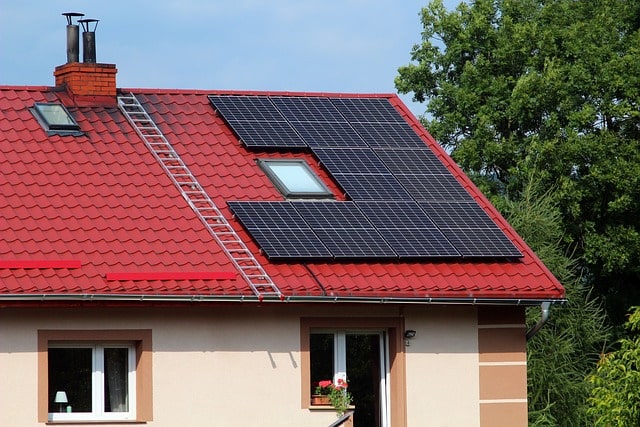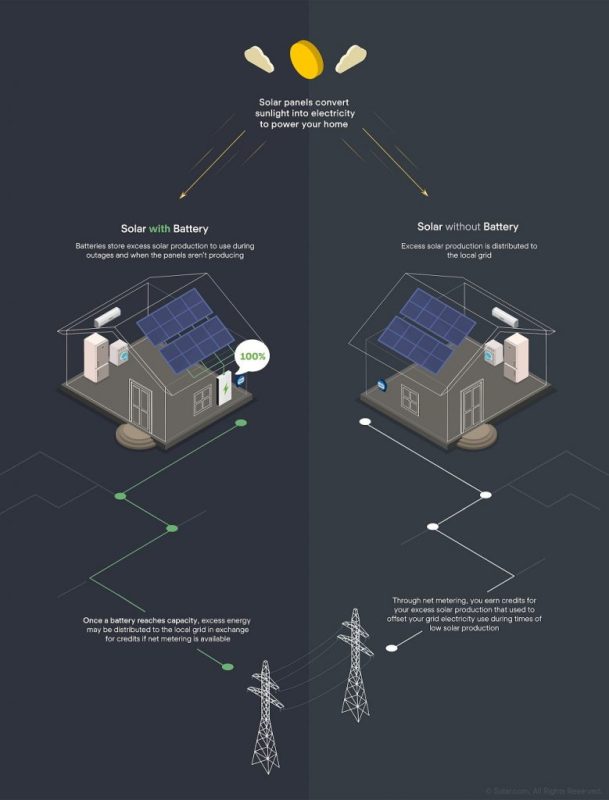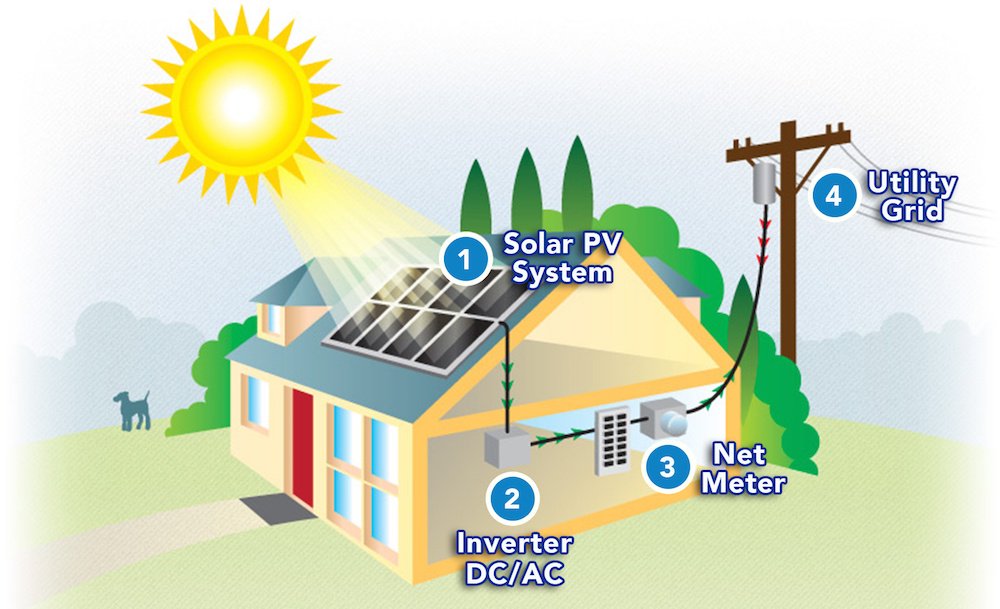에너지 저장에 대한 모든 이야기와 함께, 주거용 태양 광 시스템에 태양열 배터리 뱅크가 필요한지 물어볼 수 있습니다.. 그래서 내 집에 배터리없이 직접 태양 전지판을 사용하는 방법?
응답의 간결성은“예”입니다. 태양열 배터리 백업이 유리한 시나리오가 있지만, 모든 사람에게 필요하지는 않습니다.
이 게시물에서, 우리는 태양 전지판이있는 배터리 스토리지가 유리한 상황을 조사 할 것입니다., 간단한 옥상 태양 전지판이 최선의 선택 일 수있는 상황뿐만 아니라.

목차
배터리 없이 태양광 패널을 직접 사용하는 방법?

배터리 스토리지가 아직 실현 가능하지 않은 경우, 걱정하지 마십시오! 태양 전지판은 여전히 배터리 저장없이 주택에 전원을 공급하는 데 사용할 수 있습니다.. 사실은, 대부분의 주거용 태양 광 시스템에는 배터리 저장이 부족합니다.
주거용 태양 광 시스템은 배터리 저장없이 어떻게 작동합니까??
이른 아침과 야간은 태양 생산량이 낮지 만 에너지 수요가 더 높습니다.. 당신은 일어나서 하루를 준비하고 있을지도 모른다, 또는 저녁 식사를 준비하고 자녀들에게 학업을 돕습니다.. 그때는 많은 에너지가 필요할 때입니다., 그러나 태양 전지판 생산이 속도를 높이거나 잃을 때.
이 시간 동안 (특히 밤에), 배터리 보관이없는 태양열 소유자는 그리드에서 전기를 가져야합니다., 대규모 에너지 백업 시스템으로 기능합니다.
낮에는, 그렇지만, 태양 전지판은 집에 전력을 공급하기 위해 과도한 에너지를 생산할 수 있습니다.. 잉여 에너지는 이웃에 전력을 공급하기 위해 그리드로 공급됩니다..
태양이 빛날 때, 당신은 당신의 자신의 태양열을 활용하고 추가 전력을 그리드로 전달합니다.; 그렇지 않을 때, 그리드로부터 전원을받습니다.
이 구성은 그리드 묶음 시스템이라고합니다. 주거용 태양열 배터리 뱅크에 대한 요구 사항없이 로컬 유틸리티 그리드를 배터리로 효과적으로 사용합니다..
자신만의 배터리 저장소가있는 경우, 당신은 그리드 내로 또는 외부에 상당한 양의 에너지를 전송하지 않을 것입니다.. 당신은 당신의 자신의 에너지를 저장하고 그것을 끌어 당깁니다, 그리드가 백업에 백업 역할을합니다..
배터리가없는 태양

순 에너지 계량을 사용하는 주에 거주하는 경우, 그리드에 과도한 에너지를 보내는 것에 대한 크레딧을받습니다.. 이 크레딧은 연말에 활용되어 그리드에서 가져온 전기 비용을 상쇄합니다.. 가장 최근의 에너지 진술만으로, Solar.com은 전기 소비를 완전히 상쇄 할 수있는 태양계에 대한 다양한 견적을 만들 수 있습니다..
따라서, 그리드에서 에너지 비용을 지불하는 대신, 당신은 당신의 태양계에 대해서만 지불합니다. 그리고 장비가 상환 된 후, 전기 비용이 없습니다!
배터리가없는 태양 전지판의 순 계량
내 태양계에는 배터리가 필요합니까??
많은 경우에, 주거용 태양 전지판을위한 배터리 저장은“좋은 것”입니다. 그래도 여전히, 태양열 배터리 뱅크를 가질 때 상황이 증가하고 있습니다., 필수가 아니라면.
자주 또는 장기적인 전력 중단이 있습니다.
첫 번째, 다음 중 하나 이상이있는 지역에 거주하는 경우, 백업 배터리 구매를 고려할 수 있습니다:
- 신뢰할 수없는 전기 그리드
- 빈번한 자연 재해
- 공공 안전 정전 발생 (PSPS)
키 장치에 전원을 공급 해야하는 경우 홈 배터리 뱅크가 특히 중요합니다., 의료 장비 또는 우물 펌프와 같은, 전기 그리드가 다운되었을 때. 사실은, 자가 세대 인센티브 프로그램 (건너뛰다) 캘리포니아에서는 최대 상환을 지불합니다 100 이러한 상황에서 배터리 저장 비용의 백분율. 빈번하고 장기적인 정전이 태양과 배터리를 유리하게 만드는 또 다른 상태 플로리다.
정전 기간 동안 태양열 배터리가 집에 전원을 공급하는 시간?
시나리오에 불리한 순 계량 정책이 있습니다.. 2.
백업 전원을 제공하는 것 외에도, 배터리 저장은 에너지 비용을 줄이는 데 도움이 될 수 있습니다. 수많은 주에서, 유틸리티는 순 계량 정책을 제거하거나 교체하려고합니다.. 계획된 NEM 3.0 입법은 주변의 태양 수출의 가치를 감소시킬 것입니다. 75% 캘리포니아에서.
현재, 캘리포니아의 태양열 소유자는 대략 적립합니다 30 그리드에 수출 된 잉여 에너지에 대한 킬로와트시당 센트. 아니요 3.0, 그들은 킬로와트시 당 8 센트에 가까워 질 것입니다; 그러므로, 자신의 태양 에너지를 저장하고 활용하기 위해 배터리 뱅크를 인수하는 것이 더욱 재정적 의미가 있습니다..
추가적으로, 순 계량 정책이없는 주와 유틸리티가 있습니다.. 특정 지역에서, 그리드에 반환하는 것보다 자신의 에너지를 저장하고 활용하는 것이 더 합리적입니다..
유틸리티는 사용 시간을 사용합니다.
일부 지역에서, 그리드 파워 스윙의 가격은 하루 종일 수요에 따라. 이것은 사용 시간이라고합니다, 또는 tou, 요율.
보통, 전력 비용은 저녁에 가장 비용이 많이 듭니다, 사람들이 집에서 요리 할 때, 텔레비전 시청, 열 또는 에어컨 사용. 저녁 태양 광 생산은 충분하지 않습니다, 따라서 태양열 소유자는 그리드에서 전원을 뽑아야합니다..
배터리 저장 장치, 당신은 최고 가격을 피할뿐만 아니라, 또한 하루 동안 생성되고 저장된 저렴한 태양 에너지를 활용하거나 수출함으로써이를 활용합니다.. 상당한 전기 부하가있는 경우 특히 유리합니다., 전기 난방과 같은, 공기 조절, 또는 전기 자동차.
배터리가없는 태양 전지판
대본 #4: 당신은 에너지 독립적이기를 원합니다
중앙 유틸리티 그리드가없는 시골에 거주하는 경우, 나중에 사용하기 위해 태양 에너지를 저장하려면 배터리 저장 장치가 필요합니다.. 시스템이 전기를 생산하지 않을 때 밤에 조명을 유지하려면 필요합니다..
유틸리티 그리드에 액세스 할 수 있더라도, 많은 사람들이 자신의 재생 에너지를 창출하고 저장하는 것을 선호합니다.. 대다수의 유틸리티는 화석 연료를 사용하여 전력을 생성합니다.. 태양 에너지를 배터리 저장과 결합하여, 오염 전력에 대한 수요를 줄일 수 있습니다.
고맙게도, 인플레이션 감소 법은 배터리 저장에 대한 세금 공제를 30% 총 비용의. 여기에서 배터리 저장에 대한 가정용 청정 에너지 크레딧에 대한 정보를 찾을 수 있습니다..
배터리 스토리지가없는 태양 전지판을 사용할 수 있습니까??
현재, 주거용 태양 광 시스템의 대부분은 배터리 저장없이 작동합니다..
그리드에서 전기를 끌어 당기고 정전에 대해 지나치게 걱정하지 않는 경우, 배터리가 필요하지 않을 수 있습니다.
그래도 여전히, 태양 광 패널 배터리 저장과 관련된 이점이 있습니다. 순 계량법이 발전하고 증가하는 유틸리티 수가 사용 시간 금리를 구현함에 따라, 배터리 저장소가 점점 더 유리 해집니다. 또한 에너지 독립성을 얻고 모든 화석 연료를 포기하는 수단이기도합니다..
결론
이 기사에서는, 배터리없이 직접 태양 전지판을 사용하는 방법을 탐구합니다.. 이러한 기술과 전략으로, 우리는 태양 에너지를 더 잘 활용하고 청정 에너지 미래를위한 길을 닦을 수 있습니다..
태양 전지판을 직접 사용하는 데 관심이 있고 청정 에너지 솔루션에 대해 더 자세히 알고 싶다면, GYCX Solar에 연락 할 수 있습니다. 우리는 고객에게 혁신적인 것을 제공하기 위해 노력하고 있습니다, 지속 가능한 태양열 솔루션 및 맞춤형 에너지 시스템. GYCX Solar를 방문하여 함께 청정 에너지로 새로운 장을 시작하십시오..

자주하는 질문
배터리없이 태양 전지판과 인버터를 사용할 수 있습니까??
예, 전기 그리드에 연결된 경우 배터리없이 태양 전지판과 인버터를 사용할 수 있습니다.. 하지만, 전력 직원을 전기 백 플로우로부터 보호하기 위해 정전 중에 그리드 연결 태양계가 종종 거절되는 경우에 주목하는 것이 중요합니다..
몇몇 인버터 제조업체, Enphase 및 SMA를 포함하여, 정전 중에 직접 중요한 부하에 전원을 공급할 수있는 장치를 제공합니다., 배터리 저장 없이도. 이것은 태양계를“아일 링”이라고합니다.
태양 전지판이 배터리없이 어떻게 작동 할 수 있습니까??
배터리 저장없이, 태양계는 에너지 저장을위한 유틸리티 그리드에 의존합니다.. 첫 번째, 태양 에너지는 집에 직접 전원을 공급하는 데 사용됩니다, 그리고 과도한 에너지는 로컬 그리드에 공급되어 인근 시스템에 전원을 공급합니다.. 태양계가 충분한 전기를 생산하지 않을 때, 집은 로컬 파워 그리드에서 전력을 끌어냅니다.
순 계량 아래, 가구는 그리드에서 얻는 것과 함께 생산 된 에너지에 대한 크레딧을받습니다.. 이를 통해 태양계 소유자는 전기 요금을 낮은 태양계 지불로 효과적으로 교체 할 수 있습니다..
태양 에너지를 배터리없이 어떻게 보관할 수 있습니까??
대부분의 가정 환경에서, 여분의 태양 에너지는 현지 전기 그리드에 "저장"됩니다.. 그리고“저장,”우리는 이웃의 집에 힘을 공급하는 데 익숙해 졌다는 것을 의미합니다..
집보다 더 많은 태양 에너지를 생성하는 경우, 초과는 그리드에 공급되어 인근 장비 전원 전원. 전류가 거리가 적을 때, 이것은 중앙 유틸리티에 대한 수요를 줄일뿐만 아니라, 또한 그리드의 마모도 줄입니다.
상업용 응용 분야 용 배터리없이 태양 에너지를 저장하는 방법에는 여러 가지가 있습니다.. 이것들, EPA에 따르면, 포함하다: 펌핑 수력 전기 시스템, 가압 공기, 플라이휠 및 열 에너지 용량. 충전식 배터리 외에 수많은 유형의 잠재적 에너지가 있습니다..
